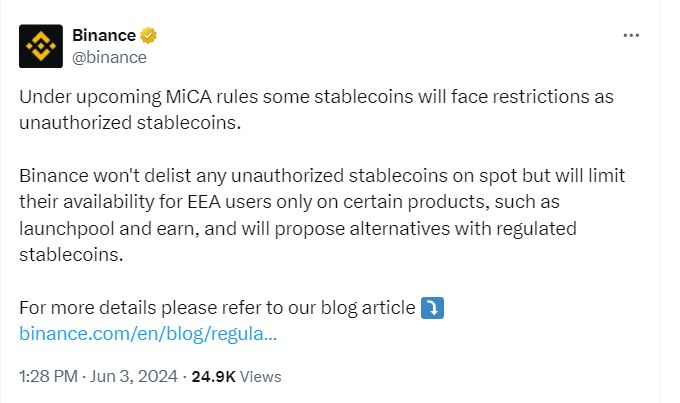Binance, the largest cryptocurrency exchange globally in terms of trading volume, has recently declared significant operational changes in response to upcoming regulations in the European Union.
The exchange is set to limit access to stablecoins deemed unregulated by the EU’s new Markets in Crypto-Assets Regulation (MiCA), which will be enforced at the end of June.
Binance Implements Phased Approach to MiCA Compliance
The implementation of MiCA represents a substantial shift towards more stringent oversight within the stablecoin sector. A pivotal element of MiCA is the licensing requirement for stablecoin issuers, necessitating them to secure approval from relevant EU authorities.
This regulation also mandates issuers to adhere to several operational protocols, including the endorsement of a “white paper” by national regulators, maintaining sufficient reserves, and ensuring secure custody of underlying assets.
When pressed for details on which stablecoins would be classified as “unregulated” and thus affected by these restrictions, Binance did not provide an immediate response.
To comply with the forthcoming regulatory changes, Binance outlined a phased approach to managing the transition. Users holding “unauthorized” stablecoins will have the option to convert their holdings into other digital assets such as bitcoin, ether, regulated stablecoins, or fiat currency. As of June 30, purchasing “unauthorized” stablecoins will no longer be possible in Europe.

Binance Announces Service Changes in EEA to Comply with MiCA
The company also announced several changes to its services in the EEA, which will also come into effect in late June. Rewards from campaigns and referrals will be distributed in regulated stablecoins, BNB, or other non-stablecoin tokens.
Copy trading for EEA users will be discontinued from June 29 at 20:59 UTC. New borrowings of unauthorized stablecoins will be prohibited, and EEA users will no longer have access to the FDUSD pool on Binance Launchpool. Subscriptions to various services including Simple Earn, Binance Loans, VP Loans, Dual Investment, Cloud Mining, and related offerings will be restricted by June 29 at 20:59 UTC.
These adjustments coincide with the enforcement of the MiCA regulations, which aim to bolster consumer protection and economic stability by imposing rigorous requirements on stablecoin issuers.
The company’s new CEO, Richard Teng, who took over after former CEO Changpeng Zhao was sentenced to four months in prison in April, has been actively working to enhance the company’s collaboration with regulators. This shift is part of Binance’s broader strategy to adapt to the evolving regulatory landscape.
Delisting of Crypto Assets Not Meeting Industry Standards
In a related development, Binance has announced that it will delist several crypto assets, including OmiseGO (OMG), Waves (WAVES), Wrapped NXM (WNXM), and NEM (XEM). The decision is part of Binance’s ongoing efforts to ensure that all coins listed on its platform meet specific industry standards.
The exchange evaluates assets based on factors such as the project’s team commitment, trading volume and liquidity, network stability and security, public communication level, and compliance with new regulatory requirements.
The delisting will take effect on May 17 at 03:00 (UTC), and all trading pairs involving these tokens, such as OMG/USDT, WAVES/BTC, WAVES/ETH, WAVES/TRY, WAVES/USDT, WNXM/USDT, and XEM/USDT, will be removed. Binance will automatically cancel all trade orders involving these tokens after the deadline.
Binance has informed its users that those holding the delisted tokens by September 18 might have their holdings automatically converted into stablecoins, though this is not guaranteed. If such a conversion occurs, Binance will notify users before the process is completed. Eligible accounts will receive the equivalent stablecoin value post-conversion.
These announcements reflect Binance’s commitment to navigating the complexities of regulatory compliance while continuing to offer robust services to its global user base. As the cryptocurrency industry matures, exchanges like Binance are increasingly required to adapt to stringent regulatory environments, balancing innovation with compliance to maintain their market leadership.
- Crypto Price Update July 24: BTC Maintains $66K, ETH at $3.4K, XRP, TON, and ADA Rallies
- Bitcoin Falls to $65K as Mt. Gox Transfers $2.8 Billion BTC to External Wallet
- News of Marathon Digital’s $138 Million Fine for Breach of Non-Disclosure Agreement Triggers a Bearish 2.5% of Its MARA Stock
- Are $530M Bitcoin ETF Inflows a Blessing or Caution?
- Metaplanet Teams with Hoseki for Real-Time Bitcoin Holdings Verification
- Building Secure Blockchain Systems: An Exclusive Interview with ARPA and Bella Protocol CEO Felix Xu
- Building The “De-Facto Crypto Trading Terminal”: An Exclusive Interview with Aurox CEO Giorgi Khazaradze
- Building a New Global Financial System: An Exclusive Interview With Tyler Wallace, Analytics Head at TrustToken
- “Solana is the Promised Land for Blockchain” — An Exclusive Interview with Solend Founder Rooter
- El Salvador: Where The Bitcoin Revolution Begins With A Legal Tender

 Why Trust Us
Why Trust Us







